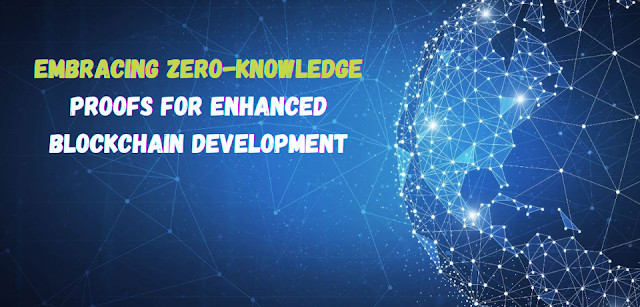Embracing Zero-Knowledge Proofs for Enhanced Blockchain Development
1.
Introduction to
Zero-Knowledge Proofs in Blockchain:
Blockchain
technology is continually evolving, with innovations constantly pushing the
boundaries of what’s possible. One such groundbreaking development is the
integration of Zero-Knowledge Proofs (ZKPs), particularly ZK-SNARKs, into
blockchain systems. These cryptographic techniques have revolutionized privacy,
security, and scalability, paving the way for a new era of secure interactions
and data protection.
2.
Understanding
Zero-Knowledge Proofs:
Zero-knowledge
proofs (ZKPs) are cryptographic protocols that allow one party (the prover) to
prove to another party (the verifier) that they know certain information
without revealing the actual information itself. This represents a significant
shift in blockchain
technology, introducing a new level of privacy and confidentiality that
enables secure transactions and interactions without exposing sensitive data.
3.
The Roles of ZK-SNARKs:
ZK-SNARKs
enhance privacy and confidentiality by allowing users to prove possession of
certain information without revealing it, which is vital in sectors like
finance, healthcare, and supply chain management where data protection is
paramount. They also enable selective disclosure, ensuring data privacy while
maintaining auditability and regulatory compliance. Beyond privacy, ZK-SNARKs
improve scalability and efficiency by generating compact proofs that are
quickly and minimally resource-intensive to verify. This is crucial for
managing large transaction volumes and optimizing blockchain resource use.
Additionally, ZK-SNARKs facilitate secure and verifiable transactions, ensuring
integrity and authenticity without exposing sensitive data. This fosters trust
and transparency in decentralized ecosystems and enables functionalities such
as anonymous voting, asset tokenization, and decentralized identity management,
broadening blockchain technology's applications and use cases.
4.
Implementing ZK-SNARKs
in Blockchain
Implementing
ZK-SNARKs in blockchain requires a deep understanding of cryptographic
techniques and efficient protocol design. The setup phase involves establishing
a common reference string and generating proving and verification keys, while
the proving and verification phases ensure secure and verifiable transactions
without revealing sensitive information.
5.
Unlocking the Benefits
of Zero-Knowledge Proofs in Blockchain
ZK-SNARKs
ensure privacy and confidentiality in transactions and interactions by enabling
users to prove knowledge of information without revealing the actual data. By
reducing computational overhead and enabling efficient verification, ZK-SNARKs
contribute to scalability improvements in blockchain networks, accommodating
growing transaction volumes. They provide verifiable and trustless
transactions, mitigating risks of data breaches, fraud, and unauthorized access,
thereby enhancing security in blockchain ecosystems. The computational
efficiency of ZK-SNARKs leads to faster transaction processing, lower costs,
and reduced resource consumption, making blockchain applications more
accessible and cost-effective. ZK-SNARKs enable users to interact anonymously
and securely on blockchain platforms, protecting sensitive information and
identities from exposure. ZK-SNARK
protocols can be implemented across different blockchain platforms,
promoting interoperability and collaboration in the blockchain ecosystem. They
can facilitate regulatory compliance by providing verifiable proofs while
maintaining privacy, enabling auditing and transparency without compromising
data security. ZK-SNARKs unlock new possibilities for innovative use cases such
as confidential smart contracts, identity management, supply chain tracking,
and secure data sharing, driving technological advancements and adoption.
6.
Challenges and
Advancements in ZK-SNARK Technology
Despite
the advantages of ZK-SNARKs, there are challenges such as trusted setup
assumptions and computational costs that need to be addressed. The initial
trusted setup phase in ZK-SNARKs poses a challenge in ensuring the security and
trustworthiness of generated parameters, as any compromise during this phase
could lead to vulnerabilities. ZK-SNARKs can be computationally intensive,
especially for complex proofs and large-scale transactions, which may affect
scalability and processing speed. While ZK-SNARKs enhance privacy, improper
implementation or side-channel attacks could potentially expose sensitive
information, highlighting the importance of robust security measures.
Understanding and implementing ZK-SNARK protocols requires a deep understanding
of cryptographic concepts and mathematical principles, posing a barrier for
some developers and users. Integrating ZK-SNARKs into regulated industries may
face challenges related to compliance with legal frameworks and regulatory
requirements, requiring careful consideration and adaptation.
7.
Advancements and
Adoption of ZK-SNARKs to change the Future Outlook:
Looking
ahead, ZK-SNARKs are poised to play a pivotal role in shaping the future of
blockchain or AI
development. Advancements in ZK-SNARK technology, including improvements in
efficiency, elimination of trusted setups, and broader adoption across various
blockchain protocols, will drive innovation and redefine industry standards.
8.
Embracing the Power of
Zero-Knowledge Proofs in Blockchain
Zero-Knowledge
Proofs, especially ZK-SNARKs, have emerged as a game-changer in blockchain
development. Their ability to provide privacy, scalability, and security
without compromising trust has opened up a world of possibilities for
blockchain applications. As blockchain development companies continue to
harness the potential of ZK-SNARKs, we can expect a shift towards more robust,
efficient, and secure blockchain ecosystems.
.png)

.png)

.png)
Comments
Post a Comment